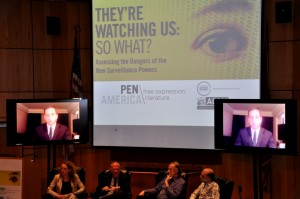Experts discuss NSA surveillance
On Nov. 14, 2013, McNally Amphitheatre at Fordham Law School was jam packed with people. The title of the event was “They’re watching us: So what? Assessing the dangers of the new surveillance powers” featuring a distinguished panel: Glenn Greenwald (Journalist), James Bamford (Author and NSA expert), Ariel Dorfman (Novelist, Playwright and Human Rights Activist), and Bruce Schneier (Computer security and privacy specialist) with moderator Suzanne Nossel (PEN American Center).
Here are some highlights of this event.
Glenn Greenwald joined via Skype since he was not given safe passage by the US government. He said that oftentimes he has heard people say, “I have nothing to hide, so why should I worry about government surveillance?” But when he asked people to give him all their passwords, people realized that privacy matters. “Public” officials should be public and transparent; and “Private” individuals should have the right to be private. But now the situation is completely reversed: the state has increased secrecy and people have lost privacy. The NSA is a perfect case.
Why is surveillance so dangerous? Greenwald gave several reasons:
1. Political: People have a need to engage in private communications. Anonymity is important for dissent and challenges.
2. Power: The more government knows about you, the more power it has over you.
3. Individual impact: When individuals know they are being watched, they’ll change their behavior, becoming stiff and formal. The minute you know you are watched, you become less free. This takes away dissent and creativity.
James Bamford added another reason. Surveillance generates a lot of mistakes, which can accidentally land innocent people on the secret NSA watch list.
Ariel Dorfman gave personal accounts of Chileans being tracked down by the Pinochet government in 1973-1990. He was permitted to return to Chile in 1983 and found that people avoided openness. He told two stories about his experiences at his return to Chile from exile: One day he read an article he had written over the phone to the New York Times for an OpEd piece. He remembered while reading that he felt panic, fearing phone was being tapped and that he would be arrested over the content of his writing. Once he was led to the basement of a government building, where he saw lots of tangles of multi-color wires. His government listened to people’s words through those wires. He said those wires were left there on purpose. It meant that they would come back and do it again.
Bruce Schneier said NSA has turned into a giant surveillance platform. Search is cheaper than sorting. NSA piggybacks on corporations’ ability to gather data via payments and threats. Technology makes surveillance too cheap and too easy. So what is the solution? Since secrets will be revealed eventually, corporations are now fighting against it for fear of damaging their PR. In addition blowback from Europe and South America, and public outcries have made surveillance more costly. Surveillance is like an arms race. A secure internet is in everyone’s interest.
In the Q&A session, moderator Suzanne Nossel asked the panel whether they are pessimistic or optimistic like Schneier. Greenwald agreed with Schneier. Before the surveillance was always domestic, but now it has becomes global. So government has to rein in the surveillance since the cost is far higher politically and economically. Schneier chimed in saying technology is not the answer. The answer is political. Transparency will raise the cost and eventually lead to change.
Bamford pointed out an irony. Generals said in front of Congress, give us more power to keep our country safer. But they weren’t able to stop the Boston bombing.
Greenwald did not believe that people don’t care about privacy. Polls already show that public opinion has shifted. People fear losing civil liberty more than terrorism. Just take a look at the broad coalition in Congress against surveillance, as a result of the horror shown by the public. Schneier agreed. The outrage arose in both parties. It’s not red or blue. The weird coalition in Congress falls across party lines. So Greenwald believes that the key to this problem is for us to finally bring about transparency and accountability.
This event was organized by PEN American Center, ACLU’s Project On Speech, Privacy and Technology, and the Center on National Security at Fordham Law School.















[…] James Bamford, an author and NSA/government surveillance expert, states, “Surveillance generates a lot of mistakes, which can accidentally land innocent people on the secret NSA watch list.” In other words, he means that government surveillance makes too many mistakes. Programs like the NSA will waste time on honest, law abiding citizens. It is not efficient enough to be able to protect our country. […]